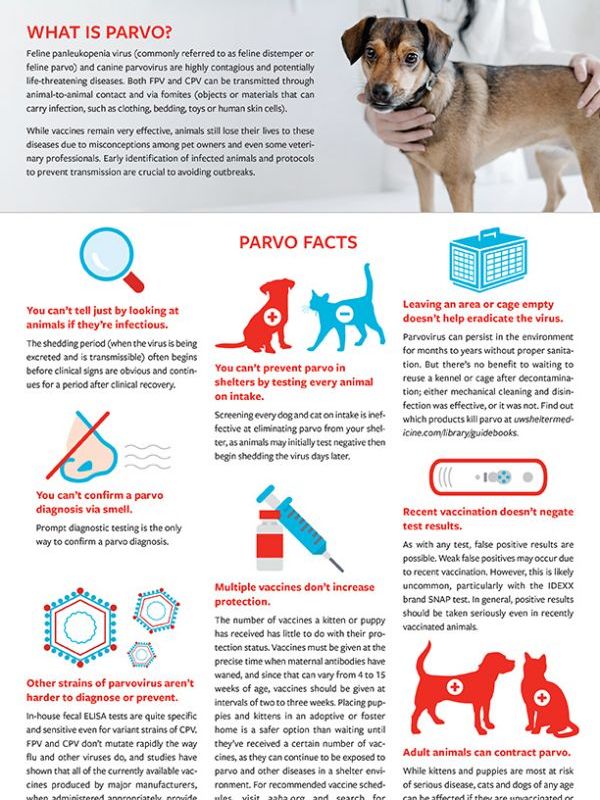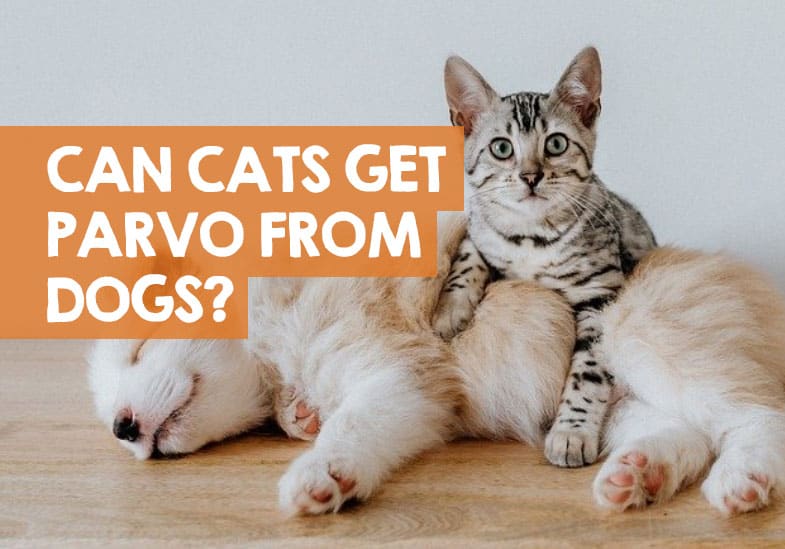A vaccine is available to prevent feline parvo. This may occur one time or it is more likely to occur most times your cat goes to evacuate his bowels.

Fact Sheet Debunking Parvo Myths Humanepro By The Humane Society Of The United States
Excessive sneezing Discharge from eyes Fever Loss of balance Difficulty walking Sudden diarrhea or vomiting Lethargy Refusal to eat.

. There is a slight risk for unvaccinated cats to catch parvo from dogs but it is rare and unlikely even if your cat is unvaccinated. Parvovirus is extremely contagious. Feline Parvovirus is spread among cats and cannot be spread to dogs.
Parvo is one more reason to have good physical and procedural separation between cats and dogs in shelters. Since parvovirus B19 only infects humans a person cannot get the virus from a dog or cat. Parvovirus is a highly contagious disease that is common among dogs and cats.
Its a small virus that first appeared in the 1970s. Their vomit and stool could contain blood. In the case of parvo diarrhea is oftentimes yellowish in color and may be tinged with blood.
The only way your cat could potentially bring parvovirus to your dog is if your cat is allowed to roam and happens to step in an area contaminated with parvovirus and then your dog licks your cat upon their return. Yes parvo in cats is transmissible to other unvaccinated cats. Puppies adolescent dogs and adult dogs who are not vaccinated are at risk of contracting the virus.
ANY vomiting puppy should be tested for Parvo. If your cat gets parvo mortality rates are high but prompt veterinary care. They may show signs of.
The risk reduces as a dog gets older. Its symptoms include vomiting diarrhea lethargy fever and no appetite. Symptoms range from fever severe dehydration diarrhea and vomiting.
Parvo in puppies is unfortunately a common disease with deadly consequences which is why it is important. If a parvo outbreak in underway in a facility prevention of potential cross-contamination from cats is required. While dogs cannot get feline parvovirus from cats cats can become infected with canine parvovirus.
Our PDSA Pet Hospitals see nearly 1500 cases of parvo each year. For unvaccinated cats the virus can be. Fortunately you can protect your dog by regularly vaccinating them against parvovirus.
They most often have much more mild clinical signs than dogs do but there is a strain of canine parvovirus that can cause severe illness in cats. How to diagnose and treat parvo in cats is rather simple with lab tests and antibiotics but you must act quickly. The feline parvovirus vaccine which is part of the core FVRCP vaccine may offer some cross-protection against canine.
The symptoms of early-stage parvo in cats are fever diarrhoea and vomiting. Either direct contact with another infected cat or transmitted via contaminated objects such as a caregivers unwashed hands food and water bowls toys clothing and bedding. However this is a rare phenomenon and does not happen in most cases.
First if your dog is old enough make sure they get their parvovirus vaccine series. This is a warning sign to get urgent veterinary care. FPV is the leading cause of cat parvo.
Cats with parvo oftentimes have violent and uncomfortable diarrhea. Other sites call this feline distemper or feline infectious enteritis The feline panleukopenia and the canine parvovirus CPV belong to the Carnivore Protoparvovirus species. Its a small single-stranded DNA virus in case youre into virology and want to know how it replicates.
Symptoms of Parvo in Cats include. Dogs and cats alike both catch parvovirus from the bodily fluids of an infected dog. It is slightly different than canine parvovirus.
Eventually it will stop feeding and drinking water. The virus also travels to the lymph nodes. Its not worth taking the chance however because on rare occasions it has happened.
If your dog or puppy is diagnosed with Parvo its best to consult with your vet about protection for your cat. Young puppies should be kept away from cats especially strays and cats from shelters until they are properly vaccinated. Cat parvo is an extremely contagious virus that has no cure.
Parvovirus parvo is a nasty virus that causes severe diarrhoea and vomiting in dogs. Parvovirus is still common in the UK and can be deadly if its left untreated. Widespread vaccinations against this virus is why parvovirus today is an occasional risk instead of a constant plague.
On the other hand Canine Parvovirus is spread among dogs and can in fact be spread to cats. BUT given that the canine strain is thought to be a mutation of feline parvo questions continue to surface as to whether or not cats are susceptible to contracting canine parvo or at least certain cats or certain strains. It can be transmitted by any person animal or object that comes in contact with an infected dogs feces.
As cats are mostly asymptomatic to canine parvovirus dog owners need to make sure that their dog is vaccinated against parvo and does not come into close contact with cat feces or vomit. Its transmitted from dog to dog through feces and vomit. As long as your cat is an indoor cat there is no risk of them spreading parvovirus to your dog.
Also dogs and cats cannot get parvovirus B19 from an infected person. Puppies are at the greatest risk for getting Parvo. Canine parvovirus commonly called parvo is a highly contagious viral disease that can produce a life-threatening illness in puppies and dogs.
This includes urine feces and vomit. Once it enters the host it infects cells that are rapidly dividing eg gut cells bone marrow cells fetal cells neonatal nerve and eye cells. Contact your veterinarian with your concerns.
The last thing any new puppy owner or dog breeder wants to hear is a diagnosis of parvo. Pet dogs and cats can get infected with other parvoviruses that do not infect humans. Parvo Is Short for Parvovirus.
These do not infect people but can affect other animals. Its not uncommon for cats with parvo to begin to vomit regularly as well. Cat parvo is an illness that is caused by the feline panleukopenia virus FPV aka feline parvovirus.
It can prevent most dogs from catching parvo at all and dogs that do catch it will have milder cases. Cats with parvo eventually develop Feline Infectious Enteritis FIE an infection of the bowels intestines. In cats panleukopenia aka feline parvo is also highly contagious and may spread from cat to cat in a few different ways.
How Parvo Is Spread. Parvo Risk To Cats It is vital that if your cat contracts parvo you get it treated right away before the situation turns critical. The parvo virus that wreaks havoc in cats is called Feline Parvovirus or Feline Panleukopenia.
Cats get feline distemper via the parvovirus. Cat parvo otherwise known as panleukopaenia is caused by feline parvovirus. Pets can be vaccinated to protect them from parvovirus infection.
Feline Parvovirus Infection Recognition Treatment And Prevention In The Shelter International Cat Care

Parvo Can Be Deadly To Dogs Especially Puppies Puppy Care Vet Medicine Parvo

0 Comments